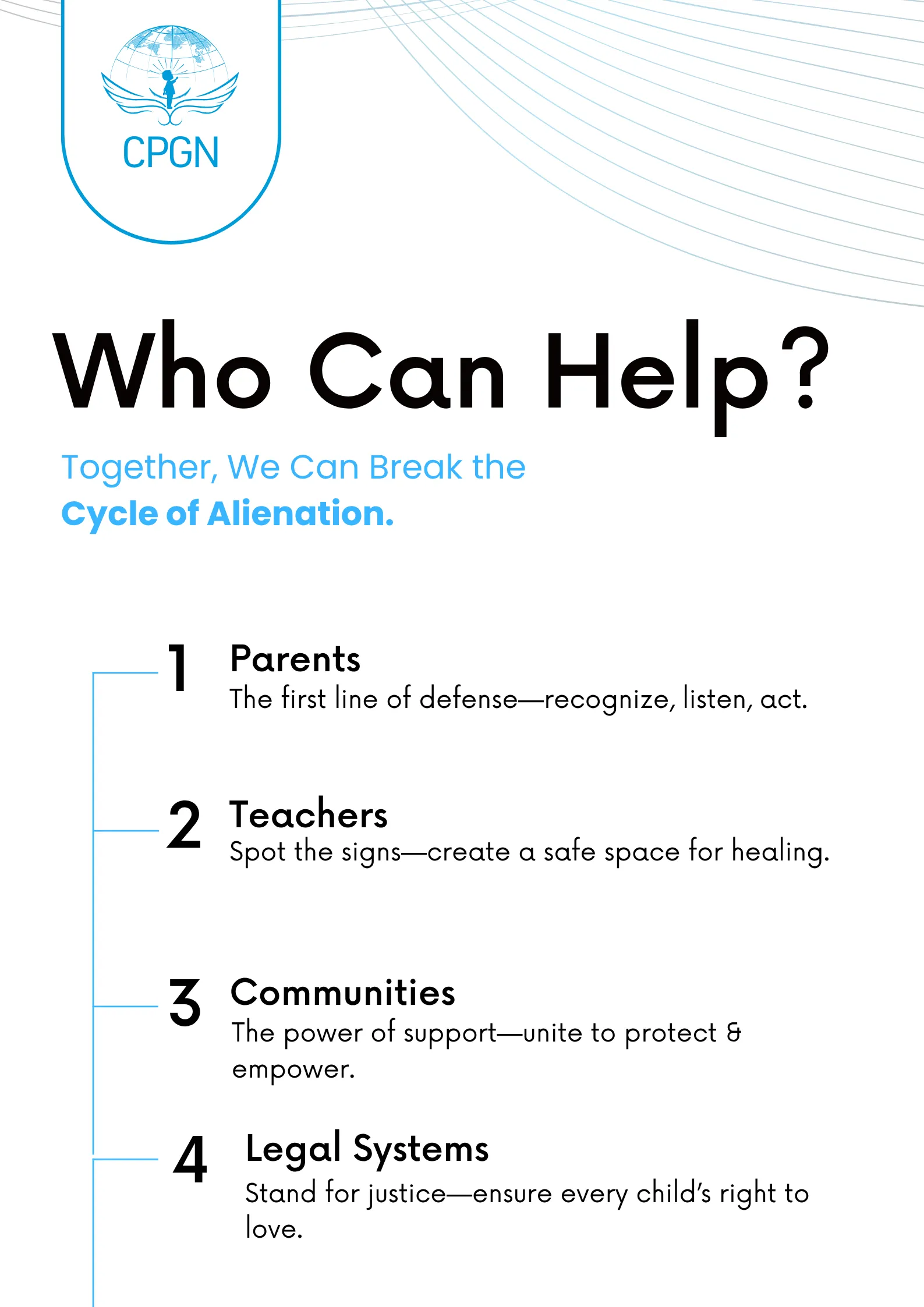Breaking the Silence: How We Can Address Parental Alienation

“I love Dad… but if I say that, Mom will be mad at me. Maybe it’s easier to just stop loving him.”
Children caught in parental alienation rarely speak these words out loud, but they feel them every day. It’s a silent, crushing choice no child should ever have to make, choosing between parents, between love and loyalty. And yet, countless children are living this reality right now.
For many families, this heartbreaking shift is not a phase, it’s parental alienation, a form of emotional abuse that thrives in silence. And silence is exactly why it continues to harm so many children.
At CPGN, we believe that breaking this silence is the first step toward healing. Parental alienation is not a private family dispute, it is a child protection issue that demands urgent awareness, recognition, and action.
Why Awareness Is So Low
Despite decades of research and lived experiences, parental alienation is still widely misunderstood. One reason is that its wounds are invisible. Unlike physical abuse, there are no bruises to photograph or hospital records to point to. Instead, the harm shows up in subtle ways:
- A child repeating negative phrases about one parent that sound rehearsed.
- Sudden hostility toward a once-loved parent.
- Guilt when enjoying time with one parent, as though love itself is betrayal.
Because these signs can be mistaken for “normal family conflict,” teachers, caregivers, and even courts often miss them.
Another reason awareness is so low is stigma. Parents experiencing alienation often feel ashamed or silenced, afraid they won’t be believed if they speak up. As one parent in a UK study shared:
“I tried to explain to my friends that my daughter refused to see me for no reason. They thought I must have done something wrong. The silence was worse than the loss itself.”
Until we name this as abuse, until we bring it into the light, children will continue to suffer unseen.
What Parents, Teachers, and Communities Can Do
The good news? We don’t have to wait for policy change to start protecting children from parental alienation. Awareness begins at home, in classrooms, and within our communities.

For Parents
- Avoid negative talk: Even an offhand comment about the other parent can plant seeds of doubt. Children should never feel like they must “choose sides.”
- Stay consistent with love: Even when rejected, keep communication open with your child — letters, texts, voicemails. Your presence matters more than you think.
- Seek support early: Therapists trained in family conflict can help children navigate the confusion without making them feel trapped in a loyalty war.
For Teachers and Schools
- Spot the signs: Teachers often see the earliest shifts — a child suddenly anxious about visits, repeating adult phrases, or withdrawing from activities. Training educators to recognize these signs can save years of emotional pain.
- Create safe spaces: Children alienated from a parent may feel isolated. Schools can provide neutral ground where children feel safe expressing emotions without judgment.
For Communities
- Talk openly: Community workshops, parenting programs, and awareness campaigns can break the taboo around discussing parental alienation.
- Support groups: Both children and alienated parents benefit from knowing they are not alone. Local and online support groups reduce isolation and offer strategies for coping.
- When everyone, parents, teachers, neighbors, friends learns to see the red flags, silence loses its power.
Why Legal Systems Should Recognize This as Abuse
The most painful truth about parental alienation is this: many courts still don’t fully recognize it. Some dismiss it as a custody battle tactic, while others underestimate its seriousness because “no physical harm” is visible.
But research paints a different picture. Studies have linked parental alienation with depression, substance abuse, anxiety, and even suicidal thoughts in adulthood (see research here). This isn’t a minor family disagreement — it’s a long-term public health issue.
Legal recognition matters because without it, alienating behaviors can go unchecked. Parents can manipulate children with few consequences, and children lose out on their right to have a relationship with both parents.
Family law experts like Dr. Jennifer Harman argue that:
“When courts dismiss parental alienation, they fail to protect the child. This is not about parents’ rights — it is about a child’s right to love and be loved by both parents.”
By treating parental alienation as a legitimate form of emotional abuse, courts could:
- Ensure custody arrangements protect children from manipulation.
- Order family therapy or reunification programs.
- Penalize behaviors that intentionally harm the parent-child bond.
Until then, too many children remain voiceless victims in legal systems meant to protect them.
Call for Advocacy – What CPGN Is Pushing For
At CPGN, we refuse to let parental alienation remain hidden in the shadows. We are committed to:
Raising Awareness: Through campaigns, educational content, and community programs, we’re breaking the silence and teaching caregivers to recognize alienation early.
Training Professionals: Partnering with schools, therapists, and legal professionals to equip them with the tools to identify and respond effectively.
Policy Advocacy: Urging lawmakers and courts to formally recognize parental alienation as a form of child abuse and to prioritize children’s emotional wellbeing in custody decisions.
Supporting Families: Offering trauma-informed care, counseling, and safe reporting mechanisms so that no child — and no parent — has to face alienation alone.
But we can’t do this without your support.
Every voice that joins this movement helps to protect children from invisible wounds. Every donation fuels counseling, community outreach, and advocacy that can transform lives.
Donate to CPGN — Together, we can break the silence and give children the safety and love they deserve.
Breaking the Silence Together
Parental alienation thrives in silence. The longer we dismiss it as “just family drama,” the more children grow up carrying scars they cannot name. But silence is not inevitable.
When parents choose compassion over conflict, when teachers recognize the signs, when communities speak openly, and when courts finally name this as abuse — we take away alienation’s power.
Breaking the silence isn’t just about awareness. It’s about giving children back their voices, their choices, and their right to love both parents without fear.
At CPGN, we believe no child should ever feel they have to choose between love and loyalty. It’s time to stand together — for truth, for healing, and for the children still waiting to be heard.
See a child in danger? If you are in immediate danger, call local emergency services. For guidance from CPGN, Get Help.
CPGN is a 501(c)(3) — donations are tax-deductible where applicable. Our goal is to ensure the safety and protection of every child until it is achieved.
Quick Links
See a child in danger? If you are in immediate danger, call local emergency services. For guidance from CPGN, Get Help.
CPGN is a 501(c)(3) — donations are tax-deductible where applicable. Our goal is to ensure the safety and protection of every child until it is achieved.
Copyright © 2026 CPGN. All rights reserved by Majnate LLP | Privacy Policy | Terms and Conditions

